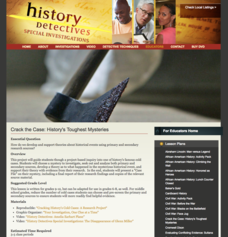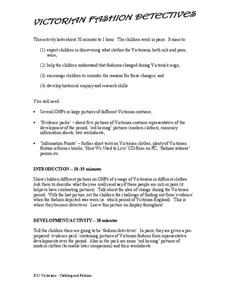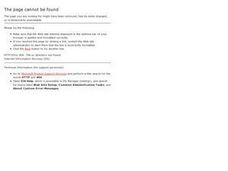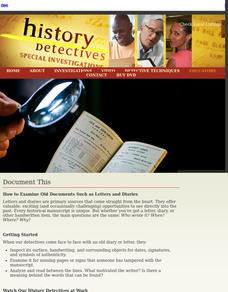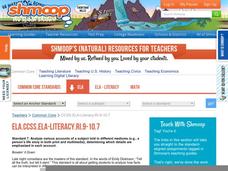Curated OER
Unit 2: Post-Revolution: The Critical Period 1781-1878
The post-Revolutionary Period of 1781-1787, also known as the Critical Period, is the focus of a series of lessons that prompt class members to examine primary source documents that reveal the instability of the period of the Articles of...
PBS
Writing a Historical Poem
Students conduct field research of a historical site in order to discover a more complete understanding of a time period. They choose one particular historical figure and write a short poem about the site from the historical person's...
PBS
1000 Words
A picture really can speak a thousand words—no matter how old! Scholars become history detectives as they learn how to analyze historical photos and evidence to uncover the past. The fun hands-on activity makes history come alive through...
Roy Rosenzweig Center for History and New Media
End of the Cold War
How significant was the Cold War during the 20th century? After reading and analyzing speeches by Ronald Reagan and Mikhail Gorbachev, learners consider the historical context of foreign policy decisions made during the Cold War by both...
PBS
Before We Travel, We Research
Context is key when it comes to historical research. Prior to field research, class members learn as much as they can about the site they are going to visit. Groups investigate and prepare presentations about the history of the site, the...
Weebly
Holocaust Diary Project
Here is a good interdisciplinary project that combines creative and narrative writing with studies of the Holocaust. Your young historians will compose a diary of experiences from the perspective of an individual living during the time...
PBS
Family History: Treasure Troves
It's time for show and tell! Scholars investigate historical artifacts to determine what secrets they reveal about the time periods they represent. They then research their own personal artifacts, as well as those from World War I.
Curated OER
Centers of the Storm: The Lyceum and the Circle at the University of Mississippi
Greek Revival architecture and the Civil Rights Movement? Sure! Examine how the Lyceum and Circle, two historic buildings located on the campus of the University of Mississippi, relate to integration and the 1962 riot on the university...
PBS
Women's History: Parading Through History
Want to teach your pupils about debate, effective speech techniques, propaganda, and the women's movement? The first in a sequential series of three, scholars analyze real propaganda images from the the historic women's movement, view a...
Smithsonian Institution
Mary Henry: Journal/Diary Writing
A great way to connect social studies with language arts, a resource on Mary Henry's historical diary reinforces the concepts of primary and secondary sources. It comes with an easy-to-understand lesson plan, as well as the reference...
PBS
Cardboard History
A PBS clip focused on collecting sports memorabilia launches this research project instructional activity. Class members then read Dan Gutman’s Honus and Me in which Wagner’s baseball card is used to time travel. The instructional...
Student Handouts
Pivotal Events
This is a simple graphic organizer that allows your class members to chronicle the progress and significance of a series of pivotal events.
PBS
Crack the Case: History's Toughest Mysteries
Young sleuths don their trench coats, tip their fedoras, and grab their notepads to investigate one of four famous unsolved mysteries. After examining multiple primary and secondary sources related to their cold case, they propose a...
While They Watched
Teaching the Holocaust
What is the difference between prejudice and discrimination? Between collaborators and bystanders? Guilt and responsibility? Prompt learners to think critically about a very complex and textured topic with an innovative packet of materials.
Stanford University
Beyond Vietnam
On April 4, 1967 Martin Luther King, Jr. delivered his speech "Beyond Vietnam." The controversy that followed is the focus of a three-lesson plan unit that asks class members to consider the political and social implications of King's...
Smithsonian Institution
Dia de los Muertos: Honoring our Ancestors Through Community Celebration
Oral storytelling has been an important part of every culture. The time-honored practice uses stories as a conduit for a culture's values and customs from one generation to the next. Keep the tradition going with a family interview...
Defining US
Integration of Education and American Society
How did the struggle for Civil Rights during the 1950s transform American society and politics? Why are American schools integrated today? Class members explore these essential questions by examining a series of primary and secondary...
Middle Tennessee State University
John Brown: Hero or Villain?
"Love it or leave it." "You're either for us or against us." Rhetoric and it's polarizing effects are the focus of a instructional activity that uses John Brown's attack on Harper's Ferry as an exemplar. Groups examine primary source...
Teaching Ideas
Victorian Fashion Detectives
The distinctive attire of royalty, working class, and peasants of the Victorian era conveys much about the conditions of the time. Learn more about why people dressed as they did, and how their fashion changed during the 64-year reign of...
Curated OER
William Apess and the Mashpee "Revolt" of 1833
Prompt your class with the following question: What was the status of American Indians in Massachusetts during Jackson's presidency? To answer this question, class members will read a series of primary source documents (attached),...
PBS
Think Like a Historian: A Viewing Guide
Calling all junior detectives! Scholars use the tools of investigation to determine the causes and impacts of the American Civil War. Using viewing guides, videos, group research, and written resources, they discover what it takes to...
PBS
Women's History: Glass Windows; Glass Ceilings
Discover stories about women's history in beautiful stained glass windows. The second in a three-part series teaches scholars about a famous artistic style of stained glass windows and the influential women that used art to impact...
PBS
Document This
Being a historian requires serious sleuthing. They examine primary source documents and look for evidence, for clues that reveal who wrote the document, when, and why. After watching two historians model the process, young history...
Shmoop
ELA.CCSS.ELA-Literacy.RI.9-10.7
When your pupils read an account of an event, are they conscious of the fact that this particular account might focus on certain details, while ignoring others? Open their eyes to bias and varying interpretation of facts with the ideas...
Other popular searches
- Musical Historical Periods
- Romantic Historical Periods
- Historical Periods Maps
- Historical Periods of Time














